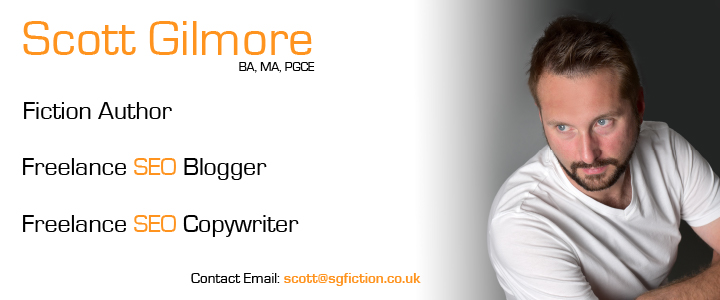Blog Writing: How To Get Articles To Rank On Google & Get More Readers
Blog writing is one of the best methods to achieve higher website traffic. However, getting articles to rank on Google is not that simple. Here’s how I do it.
In this Blog Writing article, you will find advice in these areas:
- How I use my blog to develop my profile as an author, and you can do the same as a writer,
- Blog writing myths litter the internet and you can learn the truth as I debunk them one-by-one,
- How vital keyword research is to help you create content for your website that will rank on Google,
- Developing a content plan is helpful for you to ensure all areas are covered to optimise your article’s appearance on search engines,
- Why building links is vital to make sure your blog is valued by Google, helping it to rank higher,
- Understanding the blog structure can help you put the building blocks in the right place so Google can ‘see’ the article properly on your site.
Read the rest of the Blog Writing article to learn how you can best optimise your blog to get more visitors online.
When I started blog writing as a freelance blogger and SEO copywriter, I was more qualified than many out there to get articles to rank on Google. By completing multiple digital marketing courses and having a Masters Degree in Creative Writing, I was definitely ‘qualified’ to compose blogs. However, getting articles to rank against competitors is not easy.
The idea that a blog is something that is easy to piece together is a myth, and it is also something that many businesses still see as non-essential or ‘not worth the money’. When I speak with clients and fellow fiction authors, they still don’t understand exactly what a blog is and how it should be used to enhance website traffic. There are also business owners who believe that paying £10/$15 a blog is worth it. Unfortunately, this is not the case, and those business people are wasting their money.
As authors, we are wordsmiths and have no issue composing thousands of words of fiction, poetry or lines of dialogue in a script. However, understanding the structure and work that goes in behind the scenes is vital to ensuring your fiction author blog ranks on Google. When I compose a blog about what Search Engine Optimisation (SEO) is, I get messages from fellow writers asking what it is. You are not alone friends. This is why I have composed a series of blogs for authors specifically for SEO.
Whether you are a fiction author or a marketing executive, a professional freelance blogger is someone who can seriously help your blog writing skills. As someone who is also a qualified teacher and digital trainer in Belfast, I can teach and use video conferencing to work online with those who would like help to develop blog writing. If this is something you would be interested in, contact me at scott@sgfiction.co.uk, and we can arrange a package that can suit you.
Throughout this article, I will share some of the critical areas you need to consider when composing a blog article. As someone who works as a professional freelance blogger, I will give you some tips to use right away. Let’s get started.

Blog Writing Myths
As a freelance blogger who has worked remotely for multiple agencies across the UK, I have seen some very questionable practices. I have previously written on some of the SEO Copywriting methods I have witnessed in a previous article. Still, there are some serious blog writing myths out there that need to be debunked right away.
These myths include:
- Marketers make better bloggers – You may think that those who have a first-class degree in marketing will make a better blogger than someone who is ‘unqualified’, but this is not true. Quite a few ‘marketing executives’ are excellent at other aspects of their job, but will not be able to spell, use appropriate grammar and can even use emojis in their content.
- Writers make great bloggers – Just as being a marketing executive doesn’t make you an excellent blogger, it is the same with writers. All writers can write, but just because you can throw words onto a page, it doesn’t mean you can blog. By blogging, you need to follow a series of ‘best practices’ to include the appropriate structure and plan appropriately utilising high-ranking keywords. Unfortunately, these skills are not just learned from writing.
- Blogs shouldn’t be over 500 words – When I worked alongside some marketing agencies, they were adamant that blogs should be between 5-600 words. This is entirely false. As someone who has utilised blogging to enhance my online presence a lot, you will need to write at least 1000-1200 words of copy to ensure Google doesn’t see the copy as being ‘thin’. For a vanity blog, you can write it as short as you like. However, for a professional blog or for someone looking to increase their digital presence, you must write articles with an appropriate word length.
- Blogging is a fad – This is not the case, people! Blog writing is a crucial way to generate website traffic using organic, engaging content. By sharing your blog posts on your chosen social media platforms, you will engage followers or ‘friends’ who can read and, in turn, share the content. On average, everyone has 100 Facebook friends. If you have 500 Facebook followers on your author/business page, multiply that by 100, and that is how many people could see your post if all of your followers liked or shared it. That’s a lot of website traffic.
There are many blog writing myths that I could debunk, but I don’t want to go there. Instead, I want to share some of my basic practices to help you write better blogs and increase website traffic.
Keyword Research
When you start to compose a blog article, you must link it to keywords and phrases that people are searching for online. By using free tools like Google Keyword Planner, you will be able to gather a list of keywords that people search for on Google. Once you see the terms that real people have submitted as queries, you can shape and develop content around them.
I will always remember my first introduction to tools like the Keyword Planner and Google Trends. I was to be trained in how to use the tools appropriately to conduct keyword research for clients in a marketing agency. I was told, ‘just think like a customer’ and ‘write a list of questions you’d type into Google’. These requests were beyond vague for someone new to the idea of keyword research, and I was more than confused.
One thing to remember when researching keywords is to start small and think of three areas you fit into as an author or a business. From there, you can type those into the Google tools and get ideas for terms that are searched for online. Failing that, you can copy and paste the website of another business or author into Google Keyword Planner and see which terms show up under their website URL.
When blog writing to rank online, keyword research is vital. By gathering between five and ten keywords or phrases, you will be able to plan out some initial content for your blog.
Content Plan
Once you have gathered your five to ten keywords from Google, my next tip to enhance your blog writing skills is to create an in-depth content plan. When working with businesses as a freelance blogger, I compose a detailed outline of the key areas required to develop SEO blogs for Belfast businesses and beyond.
In a previous blog, I shared the importance of a content plan for both fellow authors and also companies. To utilise the keywords you have researched to their full potential, you must plan how you will write them into the content you produce for your website.
By composing the plan, you will be able to see vital blog writing components in front of you at a glance, including:
- An engaging blog title,
- The blog ‘Meta description’,
- The keywords you will optimise, and
- Hashtags that you will use in your social media posts to maximise the post reach.
There are many more areas that you can include within the content plan creation, but I would go through these in more detail in one of my Creative Writing Courses. By working through a paid course, either via Skype or Zoom, I can delve into the deeper elements of content planning and give you more specific tips for your blog writing needs as an author or a marketing executive.

Internal & External Links
While reading this article, I’m sure you have noticed the number of both internal and external hyperlinks. This is a blog writing element that is required to have a webpage or blog article that is easy to navigate for the reader and crawler bots of search engines. If they can both navigate through your website and webpages easily, it will give your article a better chance to be more visible on search engines.
By including internal links that are relevant to the blog article itself, you also stand a higher chance of getting those who read the article to stay engaged and, in turn, stay for longer on your website. As a fiction author, I want people to learn about my fiction books as well as read by creative writing blogs. By utilising internal website links, I can make other pages of my website easily accessible to those who visit.
As a freelance blogger, I love to write informative content that can be used by fellow writers to develop their online presence. These include the creative writing blog articles I have created over the years.
Not only have I written the content to help fellow writers, but I have also made it clear that they can reference any of my Writers’ Tips articles on their websites or within pieces of their own. By doing this, they can increase the external links from their articles to other websites or sources.
When I look to compose the content, I always research the information beforehand. In turn, I can gather external links to further sources to help show Google that a lot of thought has gone into my article, and I have taken time to compose the piece. When these external links come from authoritative websites, they help raise the credibility of your website.
By searching for relevant and credible external links, you will be able to show search engines that your article and website is trustworthy rather than ‘spammy’. Useful websites to use include,
- News websites,
- Universities or schools,
- Libraries,
- Governmental sources, and
- Large multinational bodies.
These website domains are simple to acquire links and will have a high ‘Domain Authority’. These links, as well as those from other trusted sources, can be used within your blog writing arsenal as you develop and write your content over time.
Blog Writing Structure
Probably the most important aspect of blog writing for Google ranking (SEO) is that of blog structure. By using SEO best practice to compile your blogs, you will be able to structure them appropriately for search engines.
In short, the basic principles of setting out a blog include:
- Using heading tags appropriately,
- Include chosen keywords correctly throughout the piece,
- Inserting images that are optimised for SEO,
- Linking internally & externally, and
- Writing blogs of an appropriate word length.
These structural practices are covered in detail through my ‘Oh, My Blog’ creative writing course, available in the Belfast area through Eventbrite. However, this course can also be delivered via Skype or Zoom for those further afield by contacting me on scott@sgfiction.co.uk. By working with me to explore these areas in further detail, it will undoubtedly help develop your blog writing skills.
Blog Writing: The Takeaway
As a freelance blogger, I am someone who sees blog writing as a vital part of online content generation and Search Engine Optimisation. By working through a structure plan and series of steps, you can compose excellent articles that will direct website traffic both organically and on social media.
My advice to anyone looking to take blogging more seriously, either as a writer or as a business person, is to spend time on it and plan thoroughly. There is nothing worse than staring at a blank screen or writing blogs for the sake of it.
Every piece you publish online needs to have a purpose, and there must be an end goal after an allotted time. You will want to have Y website visitors or make £X of sales through your online store. By having a structured approach to blog writing, you will see results in the end.
I love my job as a freelance blogger and am glad I made the career change from full-time teaching. By applying my array of skills to blog writing, I can create bespoke SEO content for businesses as well as writers. In turn, I can provide one-to-one training for fellow authors on how to develop their online presence. If this sounds like something you would be interested in, contact me at scott@sgfiction.co.uk, and we can have a conversation about how to develop your blog writing skills in 2020.
Inside Iris and Annas Awakening are the perfect read for fans of dystopian sci-fi. Learn more by clicking on the book titles above.


